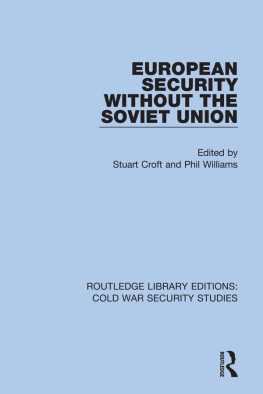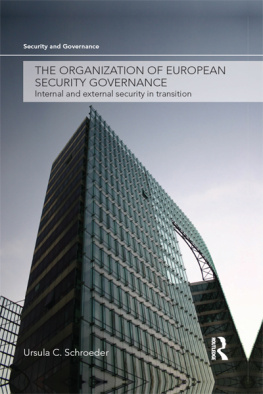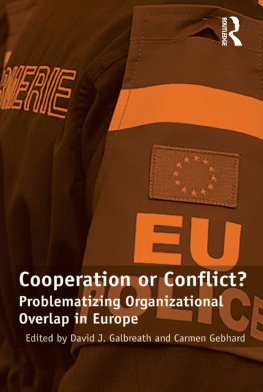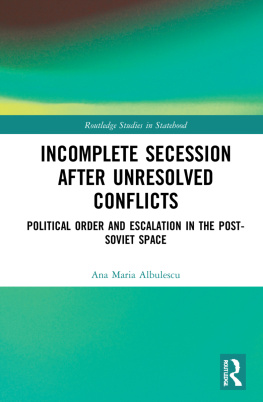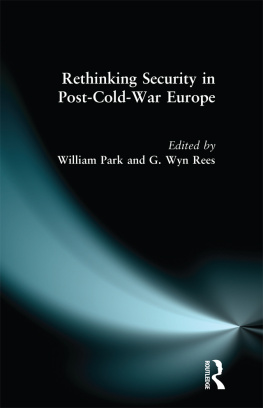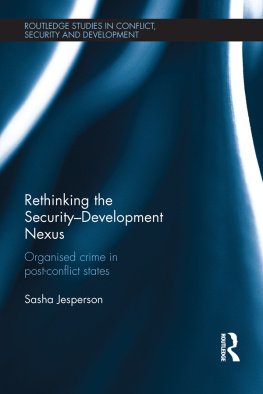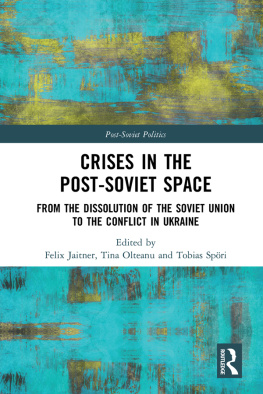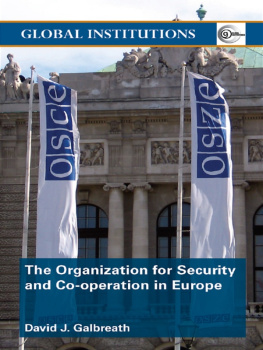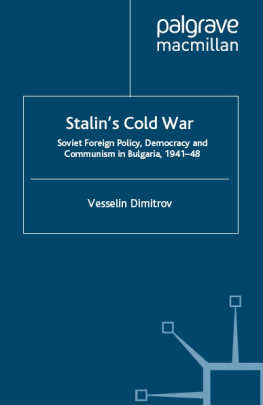CONFLICT AND SECURITY IN THE FORMER SOVIET UNION
Global Interdisciplinary Studies Series
Series Editor: Sai Felicia Krishna-Hensel
Interdisciplinary Global Studies Research Initiative, Center for Business and Economic Development, Auburn University, Montgomery, USA
The Global Interdisciplinary Studies Series reflects a recognition that globalization is leading to fundamental changes in the world order, creating new imperatives and requiring new ways of understanding the international system. It is increasingly clear that the next century will be characterized by issues that transcend national and cultural boundaries, shaped by competitive forces and features of economic globalization yet to be fully evaluated and understood.
Comparative and comprehensive in concept, this series explores the relationship between transnational and regional issues through the lens of widely applicable interdisciplinary methodologies and analytic models. The series consists of innovative monographs and collections of essays representing the best of contemporary research, designed to transcend disciplinary boundaries in seeking to better understand a globalizing world.
Also in the series
The New Millennium: Challenges and Strategies for a Globalizing World
Edited by Sai Felicia Krishna-Hensel
ISBN 0 7546 1391 7
The United States and Europe: Policy Imperatives in a Globalizing World
Edited by Howard M. Hensel
ISBN 0 7546 3319 5
Conflict and Security in the Former Soviet Union
The Role of the OSCE
MARIA RAQUEL FREIRE
First published 2003 by Ashgate Publishing
Reissued 2018 by Routledge
2 Park Square, Milton Park, Abingdon, Oxon OX14 4RN
711 Third Avenue, New York, NY 10017, USA
Routledge is an imprint of the Taylor & Francis Group, an informa business
Copyright Maria Raquel Freire 2003
Maria Raquel Freire has asserted her right under the Copyright, Designs and Patents Act, 1988, to be identified as author of this work.
All rights reserved. No part of this book may be reprinted or reproduced or utilised in any form or by any electronic, mechanical, or other means, now known or hereafter invented, including photocopying and recording, or in any information storage or retrieval system, without permission in writing from the publishers.
Notice:
Product or corporate names may be trademarks or registered trademarks, and are used only for identification and explanation without intent to infringe.
Publishers Note
The publisher has gone to great lengths to ensure the quality of this reprint but points out that some imperfections in the original copies may be apparent.
Disclaimer
The publisher has made every effort to trace copyright holders and welcomes correspondence from those they have been unable to contact.
A Library of Congress record exists under LC control number: 2002036107
ISBN 13: 978-1-138-70794-8 (hbk)
ISBN 13: 978-1-315-19872-0 (ebk)
Contents
Chapter 1
Introduction
Chapter 2
The OSCE as an Institution
Chapter 3
Turf Wars in the Development of the European Security Architecture
Chapter 4
Russia, its Neighbors and the OSCE
Chapter 5
Post-Cold War Conflicts in the OSCE Area
Chapter 6
Case-study: The OSCE in Estonia
Chapter 7
Case-study: The OSCE in Moldova
Chapter 8
Prospects and Conclusions
CALO Central Asian Liaison Office
CBM(s) Confidence-Building Measure(s)
CFE Conventional Forces in Europe
CIO Chairman-in-Office
CIS Commonwealth of Independent States
CMB Citizenship and Migration Board
CPC Conflict Prevention Center
CSBM(s) Confidence and Security Building Measure(s)
CSCE Conference on Security and Cooperation in Europe
CSO Committee of Senior Officials
EAPC Euro-Atlantic Partnership Council
EU European Union
FSC Forum for Security Cooperation
HCNM High Commissioner on National Minorities
HLPG High Level Planning Group
HoM Head of Mission
ICDS Inter Community Development Services
JCC Joint Control Commission
JCDC Joint Committee for Democratization and Conciliation
MICOM Moldovan Initiative Committee of Management
NATO North Atlantic Treaty Organization
ODIHR Office for Democratic Institutions and Human Rights
OSCE Organization for Security and Cooperation in Europe
PCA Partnership and Cooperation Agreement
PfP Partnership for Peace
PMR Pridnestrovskaia Moldayskaia Republika
REACT Rapid Expert Assistance and Cooperation Team
UN United Nations
UNHCR United Nations High Commissioner for Refugees
UNMOT United Nations Mission to Tajikistan
UNOMIG United Nations Observer Mission to Georgia
USSR Union of Soviet Socialist Republics
To Paulo and Matilde
Chapter 1
Introduction
After four decades of bipolarity, the end of the Cold War left the prospect of a peaceful Europe where the values of democracy and cooperation would prevail, as stated in the Conference on Security and Cooperation in Europe (CSCE) 1990 Paris Charter.1 New states have emerged following the collapse of the Soviet empire and Yugoslavia. New conceptions of security have taken shape, adding to politicomilitary security a socio-economic and cultural dimension. International organizations dealing with security issues in Europe have had to face up to demands to reformulate and adapt to the new conditions. But confronted with inadequate procedures, unclear task definition and the search for a place in the new Europe, the rapid succession of events has not allowed the United Nations (UN), the North Atlantic Treaty Organization (NATO), the European Union (EU), the Council of Europe and the CSCE2 time for the formulation of proper responses.
Events since 1990 have taken a different course from the peaceful one that was expected. Within the newly independent republics of the former Soviet Union, economic, social, political and historic factors have contributed to tense situations which, in particular in the Republics of Moldova, Georgia, Tajikistan and the Nagorno-Karabakh region, have escalated into armed conflict. Within the Russian Federation, Chechnya also became an area of conflict. Although these were not so much the result of external aggression, but rather the result of inner problems, these conflicts have had a disturbing effect in the Organization for Security and Cooperation in Europe (OSCE) area and continue to do so. Although there are factors which point to a long-term optimism, such as the new republics commitment to democratic principles and the rule of law, as stated at the time of their accession to the CSCE, the difficulties emerging from the transition to liberal principles and market oriented economies are enormous. Social problems marked by increasing unemployment, poverty and organized crime are common. Problematic living conditions and the difficult implementation of reforms have generated feelings of discontent. These new risks have added to the emergent transfrontier problems. Drugs and arms trading, people trafficking, environmental, technological and economic imbalances are issues of concern.


